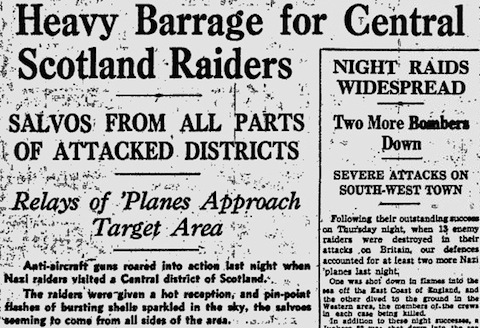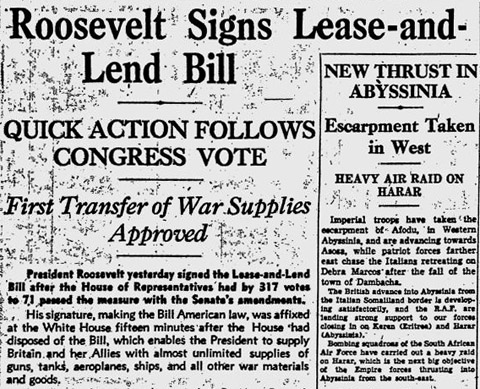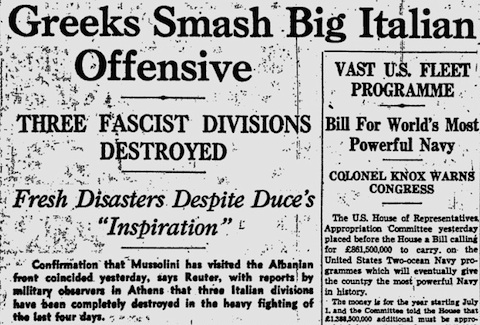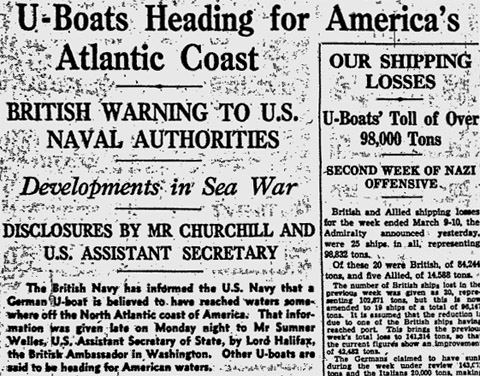
The war news today is much closer to home for the Glasgow Herald than usual. A big air raid last night on ‘a Central district of Scotland’ (5) is vividly described, as though the reporter had witnessed it: readers would know for themselves just how far away it was.
One Nazi ‘plane which appeared to be heading for home was spotted by searchlights, and immediately there was a road of gunfire as battery after battery opened up and poured shells into the apex of the searchlights.
The crackle of bursting shells followed a maze of flashes. When the gunfire stopped and the ‘plane emerged from the barrage one of its engines could be heard misfiring. The ‘plane seemed to be in difficulties and gradually losing height.
On the ground, civil defence workers ‘toiled side by side with firemen after bombs scored a direct hit on a tenement building’:
As rescue workers struggled to break down the massive barriers of broken stone and secure the safety of those feared trapped in the debris the fire-fighters poured a continuous stream of water to keep down the creeping flames.
But this isn’t all. On the previous night, Clydeside itself received a heavy raid which wrecked ‘Houses, churches, schools’: some people were killed when an air-raid shelter received a direct hit. ARP services are praised for working smoothly and heroically through the bombing. As for the air raid victims (emphasis in original):
The people of the blitzed districts spent yesterday recovering property and furniture from partially ruined homes and settling down in new billets, while a few had the tragic task of tracing missing relatives.
It was this courageous attitude to the situation which characterised the outlook of every victim of the blitz to their misfortune.
“Tell the world that we here in Scotland can also take it,” said a smiling invalid in one of the rest centres.
There’s more on Thursday night’s raid — already being called ‘The Clydeside Blitz‘ (7) — on other pages. One is especially emotive (6):
The long, fierce attack on a Clydeside town on Thursday night, in which working-class homes, trim villas and bungalows, and a few industrial establishments were set ablaze, was carried out with a grim and revolting sadism by relays of raiders.
The article asserts that ‘What angered Clydeside’ about the raid was that it seemed to be ‘a deliberate adventure in terrorism’.
For what other purpose, they argued, could the raiders be bombing again and again an already doomed tenement? For what other reason did renewed showers of bombs fall among little houses which were already blazing and shattered?
But, another article on the same page asserts:
All the violence of a merciless night of incessant bombing of a Clydeside town, with its train of homeless families, many of them suffering the ordeal of sudden bereavement, failed utterly to weaken the splendid morale of the population.
If the raid was intended to strike a blow at industry it failed, the assault falling in the main on a working-class community, which has revealed itself as heroic as any elsewhere affected by air attack on a large scale.
The leading article today is somewhat more restrained. It notes that this, the ‘first long and heavy air raid that Clydeside has suffered’ (4) could hardly be considered a surprise considering its importance as an industrial centre and as a port. It also notes the ‘remarkable record of 13 night raiders brought down’ as evidence that Britain’s night defences have improved greatly since ‘the long weeks of autumn and early winter, when the Germans were able to bomb London and other English towns night after night almost with impunity’. Given that the Luftwaffe’s ability to hit ‘targets of real military targets has been far below that of the R.A.F.’, it predicts that it may be forced to give up ‘attacks of a mainly terroristic and indiscriminate type’ and stick to ‘tactics of the kind which our airmen have made our own’, demonstrating ‘the inferiority of the Nazis […] more clearly than ever’. (This is an unusual argument: how does an effective air defence make precision bombing easier instead of harder?)
Meanwhile, the people of Clydeside, by intensifying their effort for victory, can prove to the world and the enemy that their reactions to frightfulness from the air are not less formidable than the reactions of the Londoners or the men of the English Midlands.
One such reaction: Ellen Wilkinson, Labour MP for Jarrow, on a visit to blitzed Swansea: ‘Thank God we can hit back. I never realised what a vindictive person I was until I went through this city.’
RAF Bomber Command raided Hamburg for the second night in a row Thursday night, ‘the “heaviest yet” raid on the city’ (5). The Air Ministry claims that ‘Shipbuilding yards, docks, and warehouses suffered badly’. The German News Agency, on the other hand, says that
“Most of the bombs again fell in residential districts as the violent anti-aircraft forced the British pilots to release their bombs without taking aim,” it was stated.”
Reid wraps up his series of articles on peace aims today by reiterating his call for ‘a Military Union modelled on the British Commonwealth of Nations’ (4), which must have ‘the strongest air force in the world’ and ‘undertake to protect its members automatically and unquestionally if any of them is attacked’. He considers membership. It sadly can’t be assumed that the United States won’t withdraw into isolation again. The Union would then have to be restricted to Europe and Africa ‘since it dare not repeat the error of the League of Nations by accepting members which it cannot protect’. Ideally it would only be composed of nations with ‘Democracy and economic freedom’ which, unlike ‘socialism and dictatorship’, are ‘guarantees of peaceable policies’. Finally there is the question of Germany. It can have no place in the military union; it ‘will have to be disarmed far more completely than in 1919, and the country will have to be occupied for many years’; its ‘industrial power […] will have to be broken or controlled’. Germany will have to learn its ‘lesson of peaceable self-control’ before it could join a ‘European Union’.
In an earlier article, Reid had discarded the idea of a federal union. But Sir Robert B. Greig, of Barnton, either did not read it or was not convinced by it, for he yesterday gave a speech at Stirling Rotary Club in favour of one. He pointed to the danger of aviation as justification (6):
“When you look at the modern aeroplane you would say it was invented and built by a superman,” Sir Robert continued. “But look what has happened. ‘Planes have been used by people with an ape mind, not a human mind. That is the danger we are up against. Science will run away from us altogether and we shall destroy civilisation unless there is a controlling power, and the first controlling power should be that of the prevention of war. Unless we have a Federal Union which has an overriding Government over and above national sovereignties I do not see how we can prevent war.
To end on a lighter note, the third leading article today is on war slang. It suggests that the present war has produced fewer than the last one, but notes the following: winkle bag, cigarette; gin palace, a large wireless truck; rompers, ‘the Army pet name for the new battle dress’ (4); quads, gun-pulling tractor (‘an affectionate memorial of the horse’).
The “fed up” of the last war has become “browned off” in this — a phrase in which a culinary reference is retained.
Only time will tell which of these terms, if any, will enter into general use; ‘But English will not be English if it does not open hospitable doors to a proportion of these latest outcasts’.
![]() This work is licensed under a Creative Commons Attribution-NonCommercial-NoDerivatives 4.0 International License.
Permissions beyond the scope of this license may be available at http://airminded.org/copyright/.
This work is licensed under a Creative Commons Attribution-NonCommercial-NoDerivatives 4.0 International License.
Permissions beyond the scope of this license may be available at http://airminded.org/copyright/.





Pingback: Airminded · Wednesday, 19 March 1941
Pingback: Airminded · Post-blogging 1940: final thoughts and conclusions